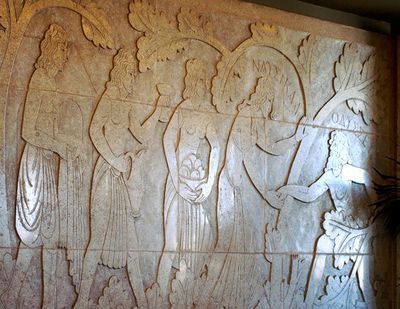Rhodes to ruin (and tea at the Midland)
By MICHAEL CAINES
There is a delirious moment in Simon Critchley's ABC of Impossibility when somebody asks him a question. It is not the question itself that disturbs him (or disturbs Critchley's alter ego at least, in this "experimental text of para-philosophical fragments working toward a poetic ontology"), but the name of the questioner:
From Simon Critchley's ABC of Impossibility. pic.twitter.com/OrdkpFhbXX
��� Michael Caines (@michaelscaines) October 27, 2015
Oddly, this neat little nightmare came to mind as I read about the ongoing debate concerning the Cecil Rhodes statue that both adorns and debases the fa��ade of Oriel College, Oxford ��� it's a mental association I couldn't wholeheartedly trust. For the ponderous question, read the statue; for the name and the oppressive history to which the name is a clue, read "Cecil Rhodes" and the whole of the British imperial project ��� no, it doesn't quite work, does it . . . .
My fellow editor Mary Beard has already blogged about the Rhodes controversy, so I won't repeat the arguments and counter-arguments here. Having rather poorly played the association game myself, though, I started to take more notice of how combatants on both sides of the debate resorted to the same kind of debate by analogy ��� some of them more effectively than others.
Howard Jacobson, for example, in a pro-statue piece in the Independent, points up at Nelson's Column, and mockingly copies the language of the censorious: "how much longer must we tolerate that vainglorious adulterer Nelson on his phallic column"? On the anti-statue side, meanwhile, Bidisha in the Guardian talks about a Quaker school in Philadelphia taking The Adventures of Huckleberry Finn off the syllabus "because of its heavy dosage of the N-word, which made students feel uncomfortable": "I���m wondering if the students were mainly white and their discomfiture was from having to confront the history (and present) of white racism as embodied in that word, or if it goes deeper than that and the racist stereotyping of Jim as emotionally naive, sentimental and simple was what stuck in their throat, as it does in mine".
For her part, thinking about the Rhodes statue meant Mary "couldn't help thinking about" what David Mitchell had said about Robert Gordon University stripping Donald Trump of his honorary PhD in peace studies (here comes an analogy within a supposedly analogous case):
"I think if it turns out you���ve made, say, Hitler an honorary PhD in peace studies, the record ought to stand as a rebuke to your whole honorary doctorate admissions policy. Otherwise it���s like a denial of historical fact: the truth is that, in 2010, Robert Gordon University thought Donald Trump was the bee���s knees and they shouldn���t get to erase that from their annals now it turns out he���s a prick."
Right or wrong, here's how I might respond:
I'm not sure I can agree wholeheartedly with David Mitchell's line of thinking. Even if he never changes his mind, other people, including university administrators, might wish to. And stripping somebody of a degree is not the same as erasing something from the annals is not the same as taking down a statue is not the same as taking Huck Finn off the reading list is not the same as ���
You get the idea. And yet rhetorically it seems there's no dispensing with likening this to that in the hope of being more persuasive (or, when preaching to the converted, as most media orators do, simply pushing the right buttons). Stripping Trump of that degree put me in mind of the stripping Lance Armstrong of his Tour de France medals, even though I know full well that they're very different cases (unless Trump's been caught doping while wearing the maillot jaune). The word association game continues.
Enough meta-journalism. Here's another little nightmare, but a sadder, more richly described one, courtesy of a writer whose work I'm reviewing for the TLS at the moment: David Constantine.
The film 45 Years, which has just been nominated for three Evening Standard Film Awards, including Best Film, is based on a Constantine short story; he published The Life-Writer, his second novel, last year (the first was published in the 1980s); and a selection of his stories has appeared, to complement both. It's from that selection, In Another Country, that I take this short story, "Tea at the Midland".
As you'll hear if you listen to the story, the frieze reproduced below is part of the story, being a contribution to the Midland Hotel at Morecambe Bay, on the Lancastrian coast, by one of the most dubious of modern artistic figures, Eric Gill. The story records an argument that arises out of the particular ��� ���if Gill were alive today", Simon Loxley has written of him, "we would be seeing him on the evening news, a coat thrown over his head, being bundled into a white security van��� ��� to reach for more general questions about a given piece of art and what we think of its maker, the person it represents, or the person we otherwise, for some reason, associate with it.
There are numberless variations on this theme, as the Rhodes statue debates imply. By offering tantalizing connections of its own, David Constantine's story seems admirably to make a virtue out of them.
Peter Stothard's Blog
- Peter Stothard's profile
- 30 followers




